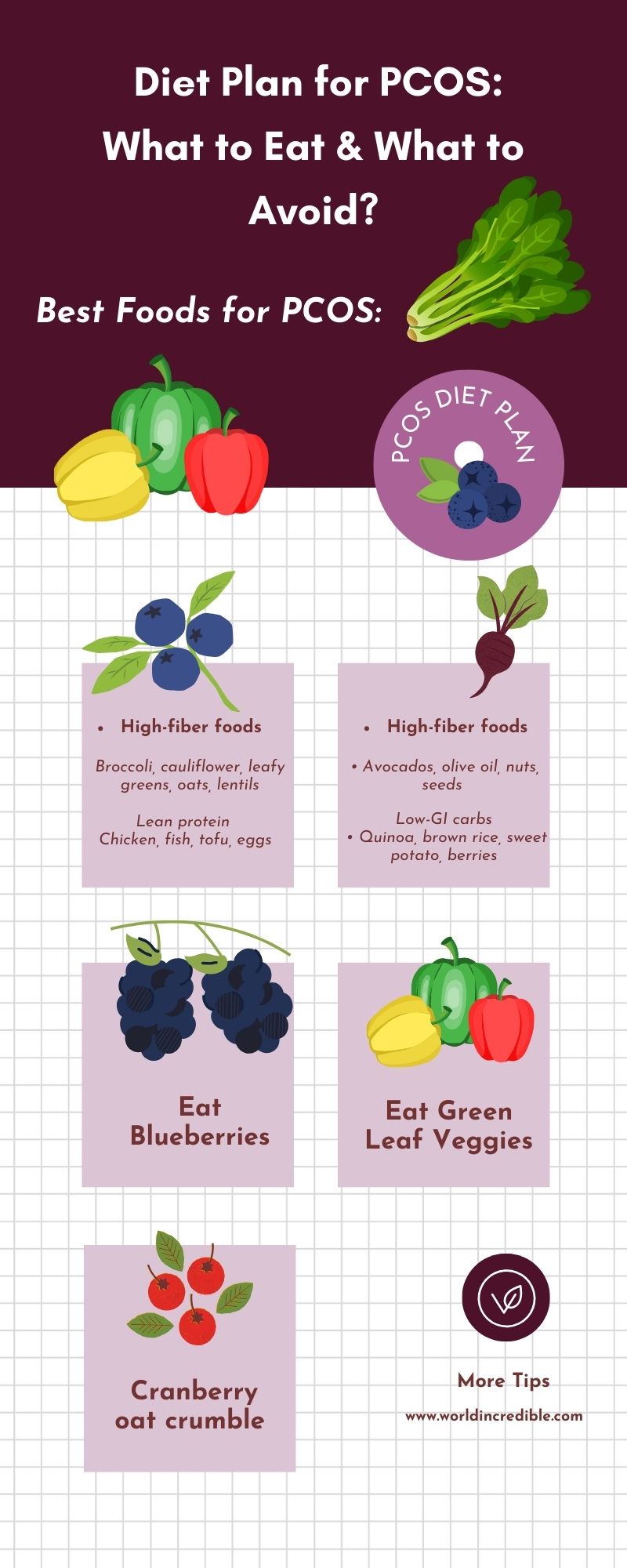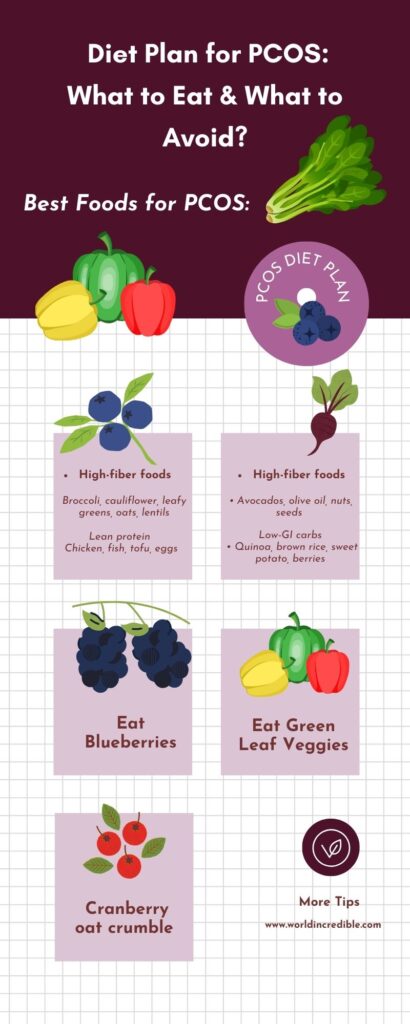Polycystic Ovary Syndrome (PCOS) affects millions of women worldwide, often causing symptoms like irregular periods, weight gain, acne, and fertility challenges. While there’s no universal cure, a well-crafted Diet Plan for PCOS can significantly manage symptoms and improve overall well-being. In this blog, we’ll guide you through a practical, balanced, and sustainable Diet Plan for PCOS that’s easy to follow and tailored to support your body’s unique needs.
Why a Diet Plan for PCOS Matters
PCOS is often linked to insulin resistance, hormonal imbalances, and inflammation, all of which are influenced by food choices. A Diet Plan for PCOS focuses on stabilizing blood sugar, reducing inflammation, and promoting hormone balance. It’s not just about weight management (though it can help); it’s about feeling energized, easing symptoms, and supporting long-term health with a strategic Diet Plan for PCOS.
Key Principles of a Diet Plan for PCOS
Before diving into the Diet Plan for PCOS, here are the core principles to follow:
- Choose Low-Glycemic Foods: Opt for foods that prevent rapid blood sugar spikes, as insulin resistance is common in PCOS.
- Balance Macronutrients: Combine healthy fats, lean proteins, and complex carbs in every meal to stay satisfied and maintain energy.
- Reduce Inflammation: Include anti-inflammatory foods like fruits, vegetables, and omega-3-rich options.
- Limit Processed Foods: Cut back on sugary snacks, refined carbs, and trans fats, which can worsen PCOS symptoms.
- Stay Consistent: Small, sustainable changes in your Diet Plan for PCOS are more effective than restrictive diets.
A Sample 7-Day Diet Plan for PCOS
This Diet Plan for PCOS is flexible, nutrient-dense, and designed for a busy lifestyle. Adjust portions based on your needs, and consult a dietitian for personalized guidance.
Day 1
- Breakfast: Greek yogurt with mixed berries, a tablespoon of chia seeds, and a handful of almonds.
- Snack: Sliced cucumber with hummus.
- Lunch: Grilled chicken salad with spinach, avocado, cherry tomatoes, and olive oil dressing.
- Snack: A small apple with a teaspoon of almond butter.
- Dinner: Baked salmon with roasted sweet potato and steamed broccoli.
Day 2
- Breakfast: Overnight oats made with rolled oats, unsweetened almond milk, flaxseeds, and sliced banana.
- Snack: A boiled egg with a sprinkle of black pepper.
- Lunch: Quinoa bowl with black beans, grilled zucchini, and a dollop of guacamole.
- Snack: Carrot sticks with tzatziki dip.
- Dinner: Stir-fried tofu with mixed bell peppers and brown rice.
Day 3
- Breakfast: Smoothie with spinach, frozen mango, protein powder, and unsweetened coconut milk.
- Snack: A handful of walnuts and a pear.
- Lunch: Turkey wrap with whole-grain tortilla, lettuce, cucumber, and mustard.
- Snack: Celery sticks with cream cheese.
- Dinner: Grilled shrimp with roasted Brussels sprouts and wild rice.
Day 4
- Breakfast: Scrambled eggs with spinach and mushrooms, served with whole-grain toast.
- Snack: A small orange and a few pumpkin seeds.
- Lunch: Lentil soup with a side of mixed greens and balsamic vinaigrette.
- Snack: Plain popcorn (lightly salted, no butter).
- Dinner: Baked cod with asparagus and mashed cauliflower.
Day 5
- Breakfast: Chia pudding made with unsweetened almond milk, topped with raspberries and shredded coconut.
- Snack: A handful of edamame.
- Lunch: Grilled veggie and hummus sandwich on whole-grain bread.
- Snack: A small peach with a few cashews.
- Dinner: Lean beef stir-fry with snap peas, carrots, and quinoa.
Day 6
- Breakfast: Whole-grain toast with smashed avocado, a poached egg, and a sprinkle of chili flakes.
- Snack: A few slices of melon with a squeeze of lime.
- Lunch: Tuna salad with mixed greens, cucumber, and a lemon-tahini dressing.
- Snack: A handful of roasted chickpeas.
- Dinner: Roasted chicken thigh with sautéed kale and roasted butternut squash.
Day 7
- Breakfast: Cottage cheese with sliced strawberries and a drizzle of honey.
- Snack: Bell pepper slices with guacamole.
- Lunch: Chickpea salad with tomatoes, parsley, and a lemon-olive oil dressing.
- Snack: A handful of blueberries and a few pecans.
- Dinner: Grilled pork tenderloin with roasted root vegetables and green beans.
Foods to Embrace in Your Diet Plan for PCOS
- Complex Carbs: Quinoa, brown rice, oats, sweet potatoes.
- Lean Proteins: Chicken, turkey, fish, eggs, tofu, legumes.
- Healthy Fats: Avocado, nuts, seeds, olive oil, fatty fish like salmon.
- High-Fiber Veggies: Leafy greens, broccoli, zucchini, cauliflower.
- Low-Glycemic Fruits: Berries, apples, pears, citrus fruits.
Foods to Limit in Your Diet Plan for PCOS
- Sugary Foods: Soda, candy, desserts, sweetened beverages.
- Refined Carbs: White bread, pasta, pastries.
- Processed Meats: Bacon, sausages, deli meats high in sodium.
- Trans Fats: Fried foods, margarine, packaged snacks.
Lifestyle Tips to Enhance Your Diet Plan for PCOS
- Stay Active: Incorporate 30 minutes of moderate exercise (like brisk walking, yoga, or strength training) most days to improve insulin sensitivity.
- Manage Stress: Chronic stress can disrupt hormones. Try meditation, deep breathing, or journaling to complement your Diet Plan for PCOS.
- Sleep Well: Aim for 7-9 hours of quality sleep to support hormone regulation.
- Stay Hydrated: Drink plenty of water and herbal teas to aid digestion and overall health.
A Note on Supplements in Your Diet Plan for PCOS
Some women with PCOS find supplements like inositol, omega-3s, or vitamin D helpful, but always consult a healthcare provider before adding them to your Diet Plan for PCOS. A dietitian can also customize your plan to target specific symptoms like irregular periods or hair loss.
Final Thoughts
A Diet Plan for PCOS isn’t about perfection—it’s about making mindful, consistent choices to nourish your body. This Diet Plan for PCOS is a starting point, but listen to your body and work with a healthcare professional to refine it. With the right foods and habits, you can manage symptoms and feel your best.
Disclaimer: Always consult a doctor or dietitian before making significant dietary changes, especially if you have PCOS or other health conditions.













